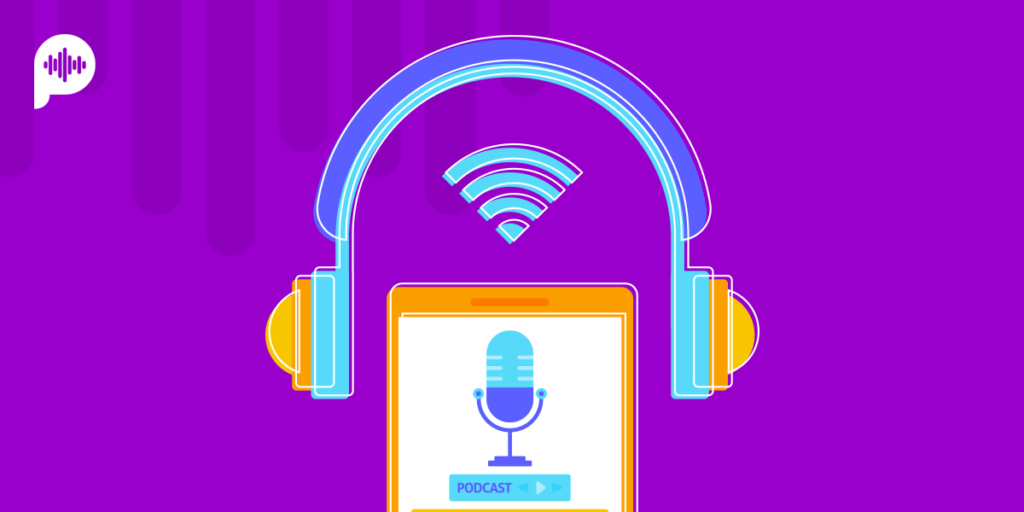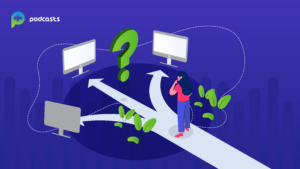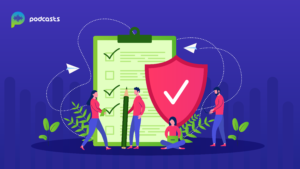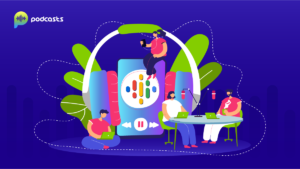With over 485 million podcast listeners worldwide, podcasts are one of the most prevalent modes of consuming high-quality content. However, with so many podcasts running and launching every day, you must keep your podcasting skills in check. Whether you are launching your first podcast or are a veteran, there is always room for learning and honing your podcasting skill more! Thus, today we will talk about the essential podcasting skills that every podcaster must have to excel in their podcasting journey! Let’s get started.
Why is it Important to Have Podcast Skills?
With so many podcasts launching every day, you need to upgrade your skills every time to stay relevant in your industry. Sure, you can be a pro at podcasting. Nonetheless, it is still better to always level up your podcasting game by learning all the necessary podcasting skills.
Learning such podcasting skills will help you create the best podcasts while your list of loyal listeners increases! Also, these podcasting skills will make your podcasting journey even easier since these are mainly focused on improving the quality of your podcasts and not settling for any less!
Presentation and Technical Skills to Start a Podcast
To make your podcasts stand out in a crowded market, you need to brush up on your podcasting skills which include but are not limited to Presentation and Technical skills. Let’s check out every nitty-gritty detail of the skills.
Presentation Skills
Your presentation skills are responsible for the interest and engagement of your audience. It is the way you convey your message to your audience. Here are a few presentation skills you should work on as a podcaster.
Formal but Friendly
While hitting the record button, you need to be well aware of every point that you will cover in the podcast. You cannot just create an impromptu podcast and expect it to be a hit. Even though the flow comes naturally, you need to have everything listed down beforehand to ensure that you don’t miss out on the vital points in your podcast. Here are some tips to consider here.
Script
Most people will suggest you not have a script before your recording since it seems like every word of yours is scripted with no natural essence. Sure, you need to have a perfect script carved beforehand. However, listing out some headings and subheadings with a gist of the topic in pointers will be a smarter move. Keep your script short with the pointers. You can expand them later while talking to your audience over the podcast.
If you are still unsure about it, you can try practicing a few times while keeping your notes right in front and talking to your audience before you start the final recording.
Tone
You have spent blood, sweat, and tears creating the entire podcast content. Don’t sound like you are not very confident about your content. This brings a clear impression of being underconfident and feeble which is a complete turndown for your listeners!
Be very assertive but not aggressive. Take charge of the words you say and sound like you believe them. Smile while you talk. This will also portray fun and excitement to your audience, resulting in a more engaging session.
Your tone should be effortless and confident. Similarly, be very mindful of your pitch and pace while you talk. Don’t rush your script, or you might end up in a maladroit situation! You need to understand that your audience needs time to absorb every word you say. Hence, take it slightly slow while avoiding the dreaded monotone.
Language
You need to ensure that you do not use any heavy jargon while you talk to your audience. This will make them pause your episode every time and Google every time, which is simply not the most enticing.
As we said, your script plays a massive role in your podcast. Even though you have all the information listed on the script, you need to talk on the mic like you are explaining it to a friend. Also, while creating a script, do not add too many heavy words which are tough to pronounce.
You will end up being perplexed during the podcast while you struggle to pronounce the terms! The main aim is to be crystal clear with your words and explain the topics most lucidly to your listeners.
Overcome Your Fear Of Public Speaking
Be it the newcomers or the veterans. Most podcasters tend to have this common phobia and the fear of public speaking. Many podcasters even get sudden panic attacks or anxiety attacks while they are in the middle of explaining a term on the podcast.
You might be wondering whether your voice is fine on the mic or if are you messing the words up while you are talking. The fear is real and something you will eventually combat.
The best way to cope with this fear is to practice multiple times before hitting the final record button.
You can try talking and recording your voice at times(don’t add it to your final recording) to identify any flaws. Next, note down the points you got stuck with and figure out potential solutions to them.
If you messed up your script while recording a podcast, take a distinct pause, clear your mind, and start again. This will ensure that you never lose hold of the pace while you are recording the podcast.
Learn to Breath
Despite being an involuntary action, we tend to struggle with it while we talk under pressure. This is very common with podcasters which tends to ruin the whole vibe of the podcast. If you get anxious, your breathing can get disrupted, which will hinder your pace and the tone of your podcast.
In case you are just stressed out while recording a podcast, take a short pause, breathe deeply, and continue talking.
Some of the common tips that will help you normalize your breathing while recording your podcast include:
- Warm up your voice beforehand. Try humming or evening a few notes to get your voice started and breathing stable. Add a slight bit of pressure on your vocal cords which will help you pronounce every word.
- At times, we tend to clench our jaws during stressful situations. Massage your cheeks with your palms and try relaxing your jaws.
- Use your diaphragm while breathing instead of using the air just at the top of your lungs. You will end up taking quick breaths and refilling frequent words, which can again affect the pace of the podcast. Keep your shoulders low, and chest relaxed.
- Even though consuming cold water can help you feel refreshed, it is a massive blunder for podcasters! Avoid cold water or beverages which contain caffeine or nicotine to prevent your vocal cords from getting clammed up. Instead, consume lukewarm water to warm up your vocal cords and get your voice loud and clear!
Get the Most from Your Interviews
Whether you are the interviewer or are getting interviewed as a guest, you need to follow all the steps before you press the record button for your interview. Here are a few of them:
- Scrape out everything about the person you are about to interview, such as their background, podcasting style, experience in interviews, and many more.
- List out every question you’re going to ask your guest and keep it handy if they complete their answers before the set duration. This will keep you both talking instead of adding an awkward silence to the conversation.
- Be very attentive to everything they say. This will help you start your next question in the right way instead of listening to them half-heartedly and bombarding them with irrelevant and redundant questions!
- Warm up the conversation beforehand. Maybe you can have a small chat over the topic before you start recording the podcast to keep the pace and the rhythm intact instead of directly jumping to a serious topic once the recording begins!
Know Your Audience
Even though you are all set by now to start your podcast, have you considered knowing your audience well? Your audience should be your prime focus. Here are some captivating questions you can ask yourself to get a better hold of your audience.
What can I assume about my audience?
If you know your audience even partly, you will already have a few assumptions about them. This will help you convey the message in a much better manner. Otherwise, you might not be able to connect emotionally, mentally, or intellectually to your listeners, resulting in a boring podcast!
What is your audience asking?
Look online to know about the trending topics and the most common questions that your audience might have. The best way to find relevant topics to discuss is to check out relevant forums or communities and identify what everybody is talking about. You can also check out Google Analytics to find the most relevant keywords that people are currently searching for.
What is your audience thinking about your latest podcast?
If you already have a few episodes up and running, you will already have multiple feedbacks and reviews on your episode. Similarly, you can send out surveys and forms to record the experience of your listeners. This will help you understating how well your audience is engaging with your podcast.
Storytelling Techniques
Everything eventually comes down to the way you convey your message. If your audience cannot resonate with what you say, there is no way that they will tune in to your next episode.
The best way to create engagement and fun within your podcasts to keep your audience hooked is to improve your storytelling techniques. Storytelling is an essential podcasting skill that most podcasters overlook. Some of the tips that may help you in building your storytelling techniques are:
- While talking about your experiences in a podcast, don’t just mention them in a listicle. Instead, take them with you through the entire journey which you want to convey. Make them feel the essence and the vibe that you went through. This will help them connect with your story even better. Talk about the troubles, struggles, risks, rewards, lessons, and whatnot. Recreate the entire journey in your own words to make them more realistic and engaging.
- While talking about the struggles in your journey, mention how you overcome the series of challenges in a very interesting way. This is a proven method to keep your audience hooked in the quest of learning the outcome of the struggle.
- Keep the curiosity intact. While you continue with your journey, it is best not to reveal the outcome of the struggles or the journey within the episode. End it abruptly yet in a flow. Let them wait for the next episode to be released. This will eventually help you to attract more listeners in the long run.
There are many more storytelling techniques. However, these are the classic ones that will help you lay the base of your podcasting journey and move in the right direction.
Talk to your Audience
Even though this is the most evident podcasting skill out of all, it still deserves special mention. However, it is not what it seems. Sure, you should talk to your audience in the podcast and connect with them. But, you can also talk to your audience even before the podcast airs! Check out the points below:
- Remind your guest you are supposed to interview after a few days. Remind them about the excitement within your audience for their presence. Also, you can email them a reminder when the podcast finally goes live. Don’t forget to send them a direct link to the episode along with the show notes page and the points to share on various social networking platforms.
- You can remind your audience about the next podcast via your social media handles. Try to get involved in discussions with your audience and get more insights about your podcast from them. Additionally, subtly give them the link to your next episode and promote it too! You can also set up your page for the same!
- Ask for reviews from your audience about the previous podcast. Your subscriptions and ratings are a motivating factor in improving your content and podcasts even more! Hence, talk to your audience and get more insight into anything they didn’t like in your previous episode!
- Add a call to action to every episode. This will portray that you value your listeners and want them to engage with your podcasts. You may want to ask them for their opinions on the topic and contribute to the discussion. This way, you can initiate a healthy conversation with your listeners while knowing more about stuff that your audience is interested in.
Technical Skills
Now that we are done with the presentation skills let’s jump to a few technical skills that every podcaster must possess to make the most out of their podcasts!
Market Research
When it comes to launching a podcast, you should do complete market research to understand what is already available and brainstorm unique ideas to make your podcast stand out.
Listen to a few popular podcasts out there and understand what are the topics they have already covered. This way, you can also find some new inspirations to talk about on your podcast.
To sum up, you need to jot down everything relevant to your podcast and create a unique script out of it while adding valuable elements.
Project Management
Whether you have a full-fledged team or a one-man army creating, editing, and producing the podcast, you need to ace the project management skill. The project management skills will help you in multiple stages of podcast production and distribution. Also, the people you will collaborate with can give valuable insights into making your podcasts even better. Their competence and knowledge can give a more polished feel to the entire podcast.
Content Creation
Your podcast is completely about how well you create your content. Your content includes the title, format, script for every episode, audio recordings, show notes, promotional materials, and whatnot.
You must be innovative and create a unique piece every time to keep your audience engaged. Even if you take inspiration from other podcasts, ensure originality while creating your content. This will help you convey the message even better and make your voice stand out!
Audio Editing
Audio editing is a major podcasting skill you can never miss out on! You cannot afford to release podcasts that have background noises or echoes! This would result in a complete mess! You can either learn the skill of audio editing yourself or hire professionals to edit your audio files every time. Either way, you need to ensure the quality every time before the podcast airs!
Suppose you do not have the budget to hire a professional. In that case, you can try out multiple free digital audio editing or recording software such as Audacity or Garageband to edit your audio files. If you are confused about how it works, you can find countless youtube tutorials showing the exact process of editing your podcast audio and making them sound professional.
Online Marketing
After you have spent all the efforts and resources in recording your podcast, you should take the necessary measures to promote it to reach your target audience.
You can either promote your podcasts on social media channels such as Facebook, Twitter, Instagram, LinkedIn, etc., or ascend out email newsletters every time about your next episode!
You can either hire an expert graphic designer or learn the skill of creating the most attractive posters for your audience! Free graphic designing tools like Canva or Headliner take hardly a few days to gain expertise and do the job well! Lastly, you need to be extremely consistent with your marketing strategies to gain visible results and attract more traction to your podcast!
Final Thoughts
Such a long list of podcasting skills may seem overwhelming. However, with the right strategy and consistent practice, you can easily ace all these podcasting skills and create the best podcasts in no time! Thus, gear up. Get your podcasting gear ready and start practicing your podcasting skills right away!












